001-Period 1 Welcome to the unit
U3P1Welcometotheunit

Roses are red Violets are blue Glad to know f_r_ie_n_d_s__li_k_e_you
A blink in our eyes o shake with our hands That’s how we all _m__a_k_e_f_ri_e_nds
相信你这个人
Calls you just to say ~Hi~ 打电话给你说声Hi
Doesn’t give up on you 从不放弃对你的信心
Envisions the whole of you 对你知根知底
Forgives your mistakes 原谅你的过错
Gives unconditionally 无条件的付出
When it rains, I think friendship is a small __u_m__b_r_e_ll_a____. It can give me a patch of clear sky.
When I’m crying, I think friendship is a white _h_a_n_d_k__er_c_h_i_e_f_. It can wipe my tears away.
1. How do you understand “friendship”? 2. Can you describe your experience about friendship problems you had? 3. What advice can you give if someone has friendship problems?
牛津
必修 第一册
Have a friendly relationship with other people
1unit1_welcome to the unit
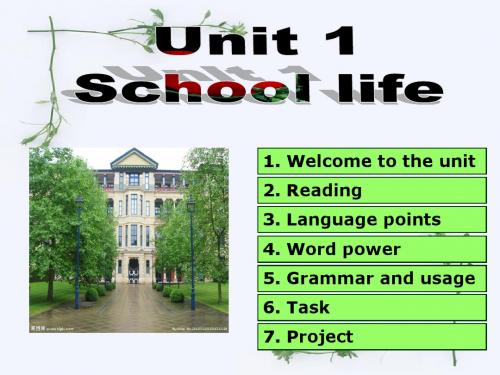
Students and teachers in both countries
have established a good relationship __________ with
each other. Therefore, students feel
_______ at ease with their teachers.
playground
teaching buildings dormitory science laboratory
canteen lecture hall
library
Well-equipped classroom with fewer students
lockers
Locker is a small box where you leave your belongings such as outdoor clothes, bags etc while you work or play sports.
a. Discuss in group of 4 (timer note-maker, reporter, etc.) b. report to the whole class.
What kind of after-school activities do you enjoy? Why?
School life
1. Welcome to the unit
2. Reading 3. Language points 4. Word power 5. Grammar and usage 6. Task
7. Project
How do you feel about your new life here in the first three days? example:
7BU1 Period 1 Welcome to the unit 教学案
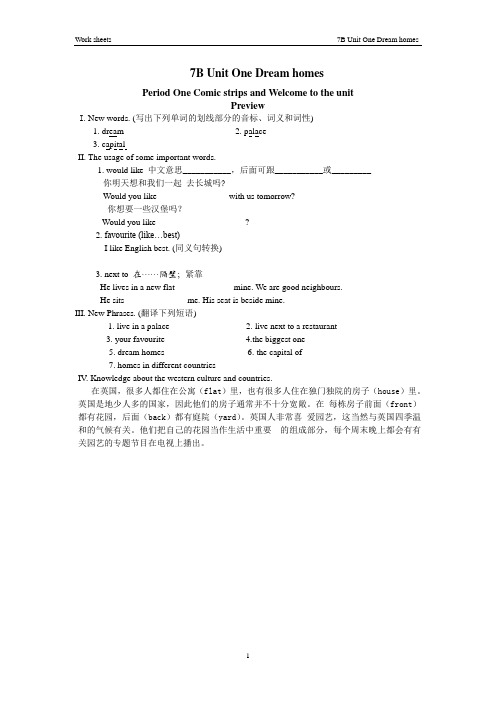
7B Unit One Dream homesPeriod One Comic strips and Welcome to the unitPreviewI. New words. (写出下列单词的划线部分的音标、词义和词性)1. dream ______________________2. palace ______________________3. capital ______________________II. The usage of some important words.1. would like 中文意思___________,后面可跟___________或_________你明天想和我们一起去长城吗?Would you like________________ with us tomorrow?你想要一些汉堡吗?Would you like ____________________?2. favourite (like…best)I like English best. (同义句转换)________________________________________3. next to 在……隔壁;紧靠He lives in a new flat _____ _______ mine. We are good neighbours.He sits ______ _______ me. His seat is beside mine.III. New Phrases. (翻译下列短语)1. live in a palace ____________2. live next to a restaurant___________3. your favourite _____________4.the biggest one______________5. dream homes_______________6. the capital of________________7. homes in different countries________IV. Knowledge about the western culture and countries.在英国,很多人都住在公寓(flat)里,也有很多人住在独门独院的房子(house)里。
译林版英语必修一 M1U1 Welcome to the unit 教学课件(共26张PPT)

Homework
• 1. Part E • 2. Revise the passage and prepare
for an interview with Wei Hua.
• 4. Who gave Wei Hua a lot of support in her studies?
The teachers gave her much encouragement.
• 5. How did Wei Hua manage to improve her English?
She used English every day and spent an hour each day reading English books in the library.
6. The cake made by Wei Hua did not
taste good.
F
Part C2:
• 1. According to the headmaster, what should the student spend much time on? They should devote themselves to study.
澧县二中 任振金
Brainstorming
What would you enjoy most in a UK school?
Reading strategy —Skimming
1. We skim a text when we want to get a general idea of what it is about.
More free style is welcomed with fewer rules and regulations.
welcometotheunit_20120910092645311
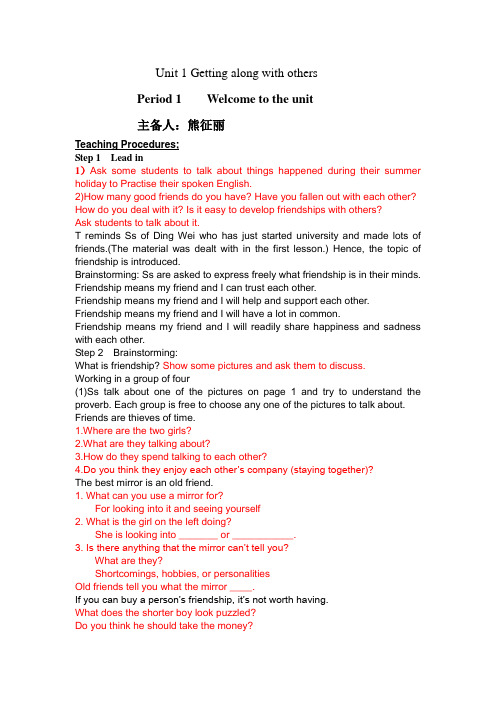
Unit 1 Getting along with othersPeriod 1 Welcome to the unit主备人:熊征丽Teaching Procedures;Step 1 Lead in1)Ask some students to talk about things happened during their summer holiday to Practise their spoken English.2)How many good friends do you have? Have you fallen out with each other? How do you deal with it? Is it easy to develop friendships with others?Ask students to talk about it.T reminds Ss of Ding Wei who has just started university and made lots of friends.(The material was dealt with in the first lesson.) Hence, the topic of friendship is introduced.Brainstorming: Ss are asked to express freely what friendship is in their minds. Friendship means my friend and I can trust each other.Friendship means my friend and I will help and support each other. Friendship means my friend and I will have a lot in common.Friendship means my friend and I will readily share happiness and sadness with each other.Step 2 Brainstorming:What is friendship? Show some pictures and ask them to discuss.Working in a group of four(1)Ss talk about one of the pictures on page 1 and try to understand the proverb. Each group is free to choose any one of the pictures to talk about. Friends are thieves of time.1.Where are the two girls?2.What are they talking about?3.How do they spend talking to each other?4.Do you think they enjoy each other’s company (staying together)?The best mirror is an old friend.1. What can you use a mirror for?For looking into it and seeing yourself2. What is the girl on the left doing?She is looking into _______ or ___________.3. Is there anything that the mirror can’t tell you?What are they?Shortcomings, hobbies, or personalitiesOld friends tell you what the mirror ____.If you can buy a person’s friendship, it’s not worth having.What does the shorter boy look puzzled?Do you think he should take the money?Do you think it is possible for a person to buy friendship?True friends have hearts that beat as one.What is a true friend?A true friend is a per son…who is trustworthywho you respect and who respects you.who is honest, caring and loving.who shares your happiness and sorrow.who accepts your differences.who is devoted and loyal to youwho is selfless / unselfish.(2) Ss give an example either their own experience or a story to show what the proverb says really makes sense.2. Representatives from each group report to the whole class the result of their discussion.3. T provides more sayings about friends and friendship and encourages Ss to talk about what they can reveal about friendship by examining these sayings.4. Ss are encouraged to think of more such proverbs and sayings and share with each other.Step 3 Further Discussion(1)What makes a good friend?Ss are asked to think about the qualities of a good friend and then are invited to write their ideas on the Bb freely.A good friend should be:Open-minded, reliable, friendly, helpful, cheerful, generous, hard-working, diligent, honest, polite…(2) How can we get along well with our friends?1. T shows Ss the following words:The recipe of friendship:1 cup of sharing2 cups of caring1 cup of forgiveness and hugs of tendernessMix all these together...to make friends forever.2. Ss are encouraged to work in a group and share with each other their ways of getting along well with friends.Step 4 Conclusion of the lesson.Ss and T together read aloud the poem: A Friend…to end the lessonA friend……Accepts you as you areBelieves in “you”Calls you just to say “Hi”Doesn’t give up on youEnvisions the whole of youForgives your mistakesGives unconditionallyHelps youInvites you overJust be with youKeeps you close at heartLoves you for who you areMakes a difference in your lifeNever judgesOffers supportPicks you upQuiets your fearsRaises your spiritsSays nice things about youTells you the truthwhen you need to hear it Understands youValues youWalks beside youX-explains things you don’t understand Yells when you won’t listen andZaps you back to reality.。
译林版(2024)七年级英语上册Unit1 Welcome to the unit课件

Let’s learn
知识点学习
初次见面时的打招呼用语,应 答时常用Nice/Glad to meet you too!,意为:也很高兴见到你!
glad adj. 高兴,与happy 同义 be glad to do sth.(=be happy to do sth.)
做某事很高兴
Let’s learn
Unit 1 This is me ! welcome to the unit
Learning objectives:
1. To master some greetings: Hello,Hi,Good morning/afternoon/evening. 2. To learn how to greet others and make new friends. 3. To learn how to introduce ourselves.
......is My Chinese/English name. ......是我的中文名/英文名。
Let’s learn
和他人见面时的问候语有哪些?你还知道哪些问候语?
Good morning! 早上/上午好! Good afternoon! 下午好! Good evening! 晚上好!
在非正式场合及日常口 语中,熟人之间常用 Morning! Afternoon! 或 Evening!进行问候。
知识点学习
相当于How about....?,其中about 为介词,后接名词、代词 或动词-ing形式。 用法1:用于询问某人/物的情况。
I can play the guitar.What about you,John? 用法2:用来征询对方的意见或提出建议等,此时常用 good idea(好主意) sounds great(听起来很棒)等作肯定回答。
Unit 1 第1课时 Welcome to the unit课件译林版2024七年级英语上册
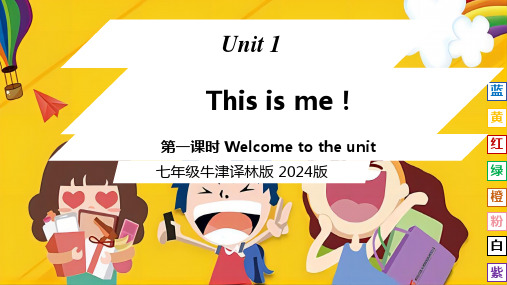
One word
红
one point.
绿
橙
粉
白
紫
Good morning, class.
Good morning, Mr Wu.
蓝
黄
红
Please greet and introduce each other.
绿
橙
So easy!
粉
Angel 白
紫
Hello, my name is Chen Dan, and
蓝
• To show the main knowledge of this unit.
黄
• Listening and Speaking : To learn how to greet and introduce 红
绿
oneself and other people.
橙
• To play some team games about words and others.
绿
Millie.
橙
粉
白
紫
Good morning. I'm Luo Yang.You can
蓝
call me Simon.
黄
红
Hi, I'm Sandy. My Chinese name is Li
绿
Shanshan.
橙
粉
白
紫
蓝 黄 红 绿 橙 粉 白 紫
glad
义 adj.高兴
same
蓝
义 adj.同一的,相同的
黄 红 绿 橙 粉 白 紫
hobby
蓝
义 n.业余爱好
黄
复 hobbies
红
U1L1 Welcome to the unit 教案

Unit 1 This is me!Comic strip& Welcome to the unitI. Teaching aims and learning objectivesBy the end of the lesson, students should be able to:1. know the two cartoon characters, Eddie and Hobo, and the six students at Sunshine Middle School;2. greet each other properly in English;3. introduce oneself to others in English.II. Teaching contents1. New words and phrases: master, e-dog, good morning/good afternoon/good evening/good night2. New structures: What’s your name?My name is …Nice to meet you.Nice to meet you, too.III. Focus of the lesson and predicted area of difficultyHow to introduce each other and greet each other in EnglishIV. Teaching proceduresComic stripStep 1 Lead-inEnjoy the video “make friends”.T: Today we’ll learn Unit 1 This is me! Do you like the song in the video? We are now new students at Donglin Middle School, and meet many new classmates. Do you want to make more friends? I’d like you to meet two new friends in our books. Do you want to know them? 【设计意图:由视频再到图片make friends引出不同人物的名字。
Welcome to the unitPeriod 1
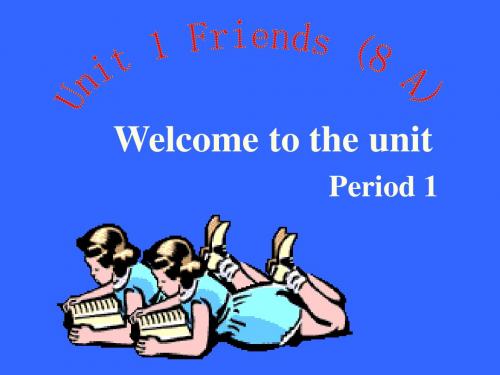
Language focus:
4.What about the pizza in your bowl? = how about...? What about sb/sth/doing sth? e.g. What about going out for a walk? 5. How well does he know his friend? e.g. I know my students very well. 很熟悉
Will Eddie share his pizza with Hobo? Can you guess?
Listen to the tape (P.2) And answer the questions.
1.What does Eddie give Hobo? He gives him some milk and a cake. 2.Is there anything else in the fridge? No, there is nothing else
7.那个特殊的时刻那儿所有的人分享着我的快乐.
•
•
At that special moment all the people there were sharing my joy.
Sum up: Qualities of good friends
1. Good friends can make you happy when you are sad . 2. Good friends can share your joy when you are happy . 3. Good friends are honest to each other and they never tell a lie ,so they can believe what their friends say . 4. Good friends can give you a hand when you have problems . They are very helpful . There is a Chinese saying “A friend in need is a friend indeed”. ike these:
高中英语Unit 1 Period 1 Welcome to the unit教案

Unit 1 Period 1 Welcome to the unitThe General Idea of the Period:This is the 1st unit of Advance with English Module I. It’s the beginning for a new high school student as well. High school period is a time of discovery, learning and hard work. Showing what the school life is in the UK can arouse the Ss’ interest and comparing the school life in China and that in the UK can expand their knowledge.Teaching Aims:Teaching important & difficult points:1.learn to compare junior school life with high school life2.ensure every student to have a chance to express himself / herself. Teaching Method:Discussion (Individual, pair or group work to make every student work in class.)Teaching Aid:MultimediaTeaching Procedures:Step 1 Greetings and free-talkMake a self-introduction and talk about the differences between junior school and senior school.T: Good Morning, boys and girls!Ss: Morning, sir / madam!T: Hello, everyone. Welcome to the senior high English class. I’m your English teacher and I’m very glad to spend this year with you. First of all, please allow me to introduce myself to you. My name is …with …as my Englishname. (Bb: Chinese and English name) I graduated from …in …and have been a teacher for …years. I like watching TV, reading novels and playing tennis in my spare time. Above all, I like my job teaching very much and do hope to have a good time with you. I’m sure we’ll soon become friends. Now you’ve just finished your junior high school and are about to enter a new period in your studies. ……T may ask several Ss to give a self-introduction as well as some of the following questions. This is a good chance for them to make themselves known. Meanwhile, the teacher may test their oral English level.1. What is your name, please? Do you have any English name?2. Which school did you graduate from? / Which school are you from? Where is it?3. Do you have any hobbies?/ What do often you do during your spare time?4. How do you spend your spare time?5. What school activities did you often have?6. Who was your former head teacher? What do you think of him / her?7. Facing a world of strangers in a new school, how do you feel?8. High school time is very important and often considered as golden time in our life. However, some of you may feel uncomfortable when first came here. What do you think you can do to overcome these difficulties?9. Well, what are the differences do you think between the life in junior school and high school are? Have you found some?(T may give the Ss some clues to make the comparison easier)T: Anyway, a new school and new student body is a great opportunity to learn about people, places and cultures. I hope everyone here can make many friends and get great success in your school work in these years.Step 2 Welcome to the unitTalk about different high school lives.T: Just now some of you introduced yourselves and said something about the differences between school lives in junior and high schools. So there must be differences in different cultures. Some of us must be eager to know what the school life in other countries are like. For example, we ’ve studied English for more than 5 years, what is the UK school life like? How different is it from inChina? You know, there are many famous schools and universities in the UK. Today, we ’ll pick up this subject. Now open your books at page 1 and read the instructions in Welcome to the Unit. Here are four pictures that show some aspects of school life in the UK. Please focus on the four pictures individually and try to determine the differences between schools in China and the UK.Encourage students to talk about each picture separately. T may use the following diagram to help students.T: There are certainly many differences between the school lives in China and in the UK, as we all can see clearly from the pictures. Do you know of any other differences?Ss: …… (pair / group work )T: Also, students in the UK have different school activities. For example, they organize school clubs, design posters or do volunteer work. In China, we also have many school activities. What kind of school activities do you enjoy?Ss: ……T: Without varieties of school activities, school life would be boring. Most of you must have drawn a picture of what high school life would be like in your mind before you came here. Now who’d like to share your dream life with us?Ss: ……Step 3 Further DiscussionT: Just as what the four pictures show, differences do exist between high schools in our country and in the UK. There are, of course, many reasons for such phenomena. What do you think the reasons are?Ss: …… ( pair / group work )Step 5 SummaryT: Today we have a good beginning. Well begun is half done. We introduce ourselves to each other, and we talk about the differences between the lives of Chinese and British high school students, from which we know students in different countries learn differently and have different school life experiences. Besides, we give a brief description of our dream school life.I do hope you’ll have a great experience here.Step 5 Homework1.Find out more differences between the lives of Chinese and British highschool students. /2.Say more about your dream school life and set a goal and make a carefulplan for your high school study. (100-word composition)3.Preview the Reading.。
Unit1Welcometotheunit教案
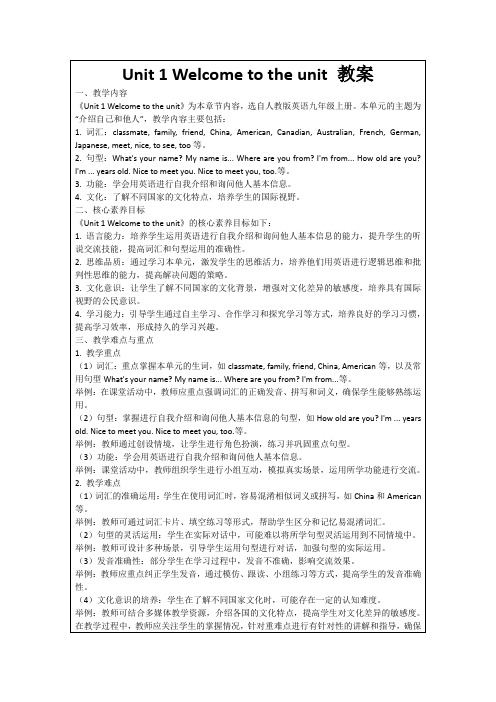
二、核心素养目标
《Unit 1 Welcome to the unit》的核心素养目标如下:
1.语言能力:培养学生运用英语进行自我介绍和询问他人基本信息的能力,提升学生的听说交流技能,提高词汇和句型运用的准确性。
2.思维品质:通过学习本单元,激发学生的思维活力,培养他们用英语进行逻辑思维和批判性思维的能力,提高解决问题的策略。
2.句型:What's your name? My name is... Where are you from? I'm from... How old are you? I'm ... years old. Nice to meet you. Nice to meet you, too.等。
3.功能:学会用英语进行自我介绍和询问他人基本信息。
在教学方法上,我尝试采用了情境教学法,让学生在实际场景中运用所学知识。从学生的反馈来看,这种教学方法效果不错,有助于提高他们的学习兴趣和实际运用能力。在今后的教学中,我将继续探索并运用更多有效的教学方法,激发学生的学习热情。
最后,关于教学评价,我认为除了课堂表现和作业完成情况外,还应关注学生在课堂外的英语实践应用。因此,我将鼓励学生在日常生活中尽量使用英语进行交流,培养他们的语言习惯,提高英语实际运用能力。
3.文化意识:让学生了解不同国家的文化背景,增强对文化差异的敏感度,培养具有国际视野的公民意识。
4.学习能力:引导学生通过自主学习、合作学习和探究学习等方式,培养良好的学习习惯,提高学习效率,形成持久的学习兴趣。
三、教学难点与重点
1.教学重点
(1)词汇:重点掌握本单元的生词,如classmate, family, friend, China, American等,以及常用句型What's your name? My name is... Where are you from? I'm from...等。
高中英语Unit 1 Period 1 Welcome to the unit 教案

Unit 1Period 1 Welcome to the unitThe main idea of the period:Five pictures of this part will make students interested in the theme of this unit. The questions for discussion can improve students’ speaking ability and can arouse students’ interests for speaking and discussing.Teaching Aim:Enable students to master the key words and sentences, read the newspaper articles and learn what happened to the boy Justin FosterTeaching Important & Difficult Point;Learn how the strange thing happened in the articleThe features of a newspaper article.Teaching Methods:Skimming, Scanning, Discussion and Role-playTeaching Aids:Tape recorder and some slidesTeaching Procedures:Step 1 Lead-inThis unit is about some unsolved mysteries in the world. First ask students about the mysteries they have heard of and their opinions on these mysteries. Then let them talk about a famous film of science fiction---E. TT: Today's science is highly-developed and advanced as we all know. But do you think scientists can explain all phenomena in the world? Do you know any strange things that are still unsolved today by scientists?S: I know. For example, UFO. There have been many reports about UFO. Some people in different cities said that they had witnessed UFO. A young man from Beijing even said that he was once taken away by aliens to a flying object for an experiment.T: Oh, that's really unbelievable. Do you believe in that? What else?S: The monster in Tianchi of Jilin province. Some witness said it looks like a cow; some described it as a dragon with long neck. 1 wish I will be lucky to see them with my own eyes one day. That will be exciting. T: I found that some of you have already known much about some mysteries. But we don't haveenough evidence to believe in all of them. In spite of the advanced science and technology, the world we live in is still full of unsolved mysteries. The topic today reminds me of a famous science fiction film. Do you know what I am thinking of?. S: Do you mean E. T. ?T: You got it. It used to be a very popular money- making film in America in the 1980s. Have you ever watched it?S: Yes, I know it well. It was directed by the world-famous director Steven Spielberg and it tells about a friendly alien who lived in our world and made friends with a group of children.T: By the way, what do you think of this film?S: I think it is very touching and exciting. I was moved to tears many times especially when the E. T. was dying and one of the children liked him so much that he became seriously ill as well. I've learnt from it that E.T. is just like us humans. He also needs friendship, love and help.T: The film is good in many ways and many people still love it after all these twenty years. I like this film, too. I first watched it when I was a teenager and I can still remember some plots of it even today! Do you believe there are aliens living on some planets? If there are, do you think they will get along well with humans on earth? You can discuss it after class. Now turn to page 1. Let's look at some pictures about some unsolved mysteries. Have you heard of them before? Which picture impresses you most? Why?S: The second picture impresses me most. The animal is so tall and strong and I thought it was a gorilla at the first sight. I can't believe it lives in the Himalayas. If I have a chance to go to the western provinces some day, I may be lucky enough to see one! I hope one day they can be brought to our natural park and get adapted to our modern life.S: The third picture impresses me most. I became interested in the monster when I learnt about itfrom the junior textbook. It is so beautiful. It looks like a huge goose swimming in the lake. Many people are said to have taken pictures of it and I can't believe it could be a sunken ship, no !Ask students to answer the questions, below the pictures.T: Read the questions below the pictures and answer them.Sample answers:1. Yes. Because some people have seen them with their own eyes even though I haven't seen one till now. And many pictures have been taken about them just like these in our textbook, so I think they are believable though unexplained today.2. I know some other tales, for example the mysteries about the Bermuda, where sailing ships usually get lost for no good reason. People doubt if there are monsters or strange shapes of the surroundings there and many more mysteries remain to be discovered.1.I am always dreaming of seeing a UFO or a monster some day. If one day I was lucky enough to see a UFO, I would beglad to be invited to visit the aliens in space and maybe I can learn a lot about their life and work. But I would feel too scared to take any pictures up close when coming across a monster.T: We have answered the three questions and I think that you must want to know more about these mysteries. Now you can look ed at the slides.Step 2 QuestionsT: now, let’s answer the questionsDo you believe in unexplained things such as UFOs, yetis and Monsters?S1: Yes, I do .T: Why?S1: Because…T: What other unexplained thongs do you know about ?S1…The teacher can ask more questionsStep3 ListeningT; Please turn to page 86 in workbook to finish Parts A and B. .You will know more about UFOs.Step 4 SummaryT: In our life, there are a lot of unexplained stories. Try to think more after class and tell them to your classmates. Step 5 HomeworkCollect more information about these mysteries.。
Unit 1 Welcome to the unit

教学重点
Learn to talk about some symbolic buildings in six countries in English .
Tokyo Ottawa Moscow Washing D.C London Paris
3 . Practice
1 ) Practice in pairs like this to talk about some places of interest and arouse the students’interest in the topic in this unit .
A . Do you like travelling ?
B. Yes , I do .
A. Do you know Moscow ? Is it the capital of…..?
B……
2 ) Ask students to complete Part A On Page 7 .
3 ) Talk about each picture by using Part B as a model
2.Presentation
First introduce the six countries and their capitals to the students by using some pictures .
1)It’s in North America . Dr Bethune was born in this country.( Canada )
6 . Homework
Unit 1 Welcome to the unit
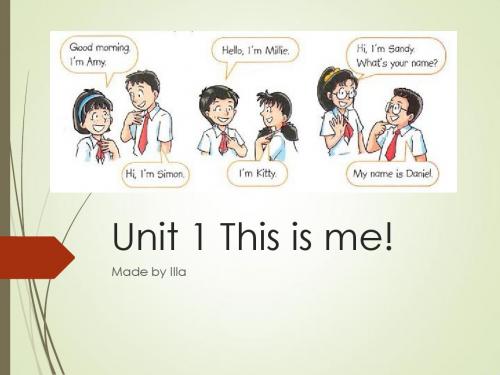
第一人称复数 第二人称复数 第三人称复数
填空练习Practice!
1、我是Amy. I ____ am Amy. 2、我们是学生。 are students. We _____ 3、你不是Millie. are not Millie. You _________
阳光中学
介绍他人Introduce other!
数学
c
a
d
b
F T F T F F F T
介绍他人Introduce other one!
Millie 1、This is ______________.
介绍他人Introduce other one!
Millie 1、This is ______________. She is a new student at _______________________. Sunshine Middle School 2、________ 12 years old. 3、she is _____ Sunshine Middle School 4、she is from ___________________. 5、She has ________ short hair. short =Her hair is _________.
tall
sቤተ መጻሕፍቲ ባይዱort
slim
heavy
6、I have ________ hair. =My hair is _________.
long
short
介绍自己Introduce yourself!
7、I love ______________. Tips:love +动词ing形式 如:reading、dancing、swimming
Unit 1 Welcome to the Unit
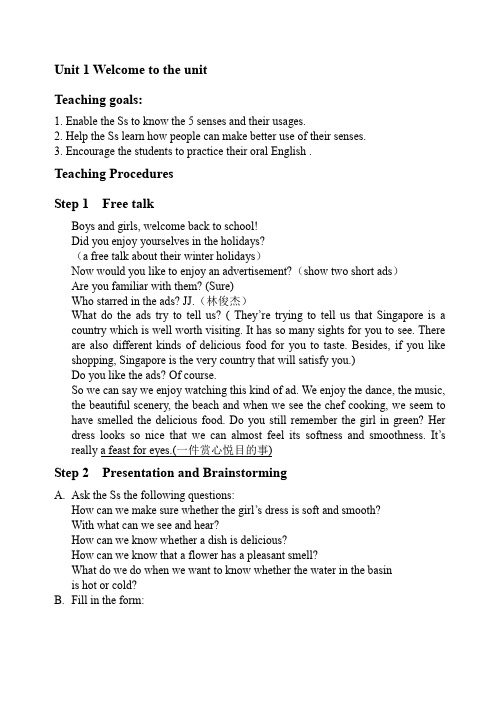
Unit 1 Welcome to the unitTeaching goals:1. Enable the Ss to know the 5 senses and their usages.2. Help the Ss learn how people can make better use of their senses.3. Encourage the students to practice their oral English .Teaching ProceduresStep 1 Free talkBoys and girls, welcome back to school!Did you enjoy yourselves in the holidays?(a free talk about their winter holidays)Now would you like to enjoy an advertisement?(show two short ads)Are you familiar with them? (Sure)Who starred in the ads? JJ.(林俊杰)What do the ads try to tell us? ( They’re trying to tell us that Singapore is a country which is well worth visiting. It has so many sights for you to see. There are also different kinds of delicious food for you to taste. Besides, if you like shopping, Singapore is the very country that will satisfy you.)Do you like the ads? Of course.So we can say we enjoy watching this kind of ad. We enjoy the dance, the music, the beautiful scenery, the beach and when we see the chef cooking, we seem to have smelled the delicious food. Do you still remember the girl in green? Her dress looks so nice that we can almost feel its softness and smoothness. It’s really a feast for eyes.(一件赏心悦目的事)Step 2 Presentation and BrainstormingA.Ask the Ss the following questions:How can we make sure whether the girl’s dress is soft and smooth?With what can we see and hear?How can we know whether a dish is delicious?How can we know that a flower has a pleasant smell?What do we do when we want to know whether the water in the basinis hot or cold?B.Fill in the form:the time. We learn about the world through the five senses. We use the five senses to study, work and relax, but there are some people who have lost one or more of their senses. What would happen if you lost one or two of your senses?Questions: people who can’t see --- blindPeople who can’t hear --- deaf.C. Do you know how blind people can read?(They can read by touching raised dots which represent numbers and letters. This system is called Braille.)D. How do the deaf communicate with each other?(They use body language or sign language.)Step 3 Sharing information and ObservationDo you believe sometimes senses may cheat us and they may affect one another? Show four pictures in the book.What can you see in the Picture ?(If we look at the white part, we can see a vase. Now please look at the black part, what can you see? Two faces.)Which line is longer, line x or line y? Are the two lines of the same length?( You can use your ruler to measure the two lines or you can use two pieces of paper to cover both ends of the two lines.)Are lines m and n straight ?How can you prove that the two lines are straight?(You can place a ruler next to the line ,or you can also use a ruler to draw more straight lines which run parallel to the two lines.)How do you read line b? Can the symbols be read in only one way?(Line b can be read K, B, R, M; or K, 13, R, M. )Step 4: DiscussionA. Ask the students the following question and then have a group discussion. Ensure that all the students have a chance to speak. Ask some students to report their answers to the whole class.Why are people misled by their own eyes?After the discussion the teacher draw the conclusion thatBecause the background or other lines confuse the eyes. Also, what we expect to see can change what we see. In fact, it is more the brain that is confused than the eyes.( Remind the students that no matter how our eyes may cheat us, we do need our eyes as well as other senses. So we should protect our senses. We can see that health is very important in our life and good senses also improve our life quality. Maybe the best way to avoid being cheated by our senses is that we sense, and at the same time, we think. )Discuss the 3 questions in the bookSome people who have made great achievements though they have lost one of their senses. (Optional)Beethoven is known as one of the greatest composers in history. His music changed the way people listened to music. Early music was mainly heard in churches. People listened to Beethoven’s music for pleasure. At the age of 27, Beethoven became very ill, and started going deaf. However, he didn’t stop composing and performing music, even though he couldn’t hear it. During his lifetime, Beethoven made 9 symphonies, 1 opera, 32 piano sonatas and 5 piano concerts.Zhang Haidi was born in Jinan in 1955. When she was 5 years old, she suffered from spinal cord disease , and was paralyzed below her chest. However, she never gave in to the fate. She overcame many difficulties to learn all by herself. She learned all courses of elementary school, middle school and university . She has also taught herself English , Japanese , German and Esperanto and assiduously studied the course of the Master’s degree. Until now,Zhang Hai Di has written and translated many books. She is a CPPCC National Committee member now , holds office at Shandong Writers Association , is engaged in to create and translate.Step 5: Show more pictures to the students (Optional)1.Which square is bigger, the white or the black?2. Which circle is bigger, the white or the black?3. Which circle is bigger, A or B?4. Please focus on the dot in the center and move your head backwards and forwards What happens?5. Move or not?6. How many people are there in the picture?7. Of course we can see an old man. Look more carefully! What else can you see?8. What do you see in the picture?。
Period1 Welcome to the unit
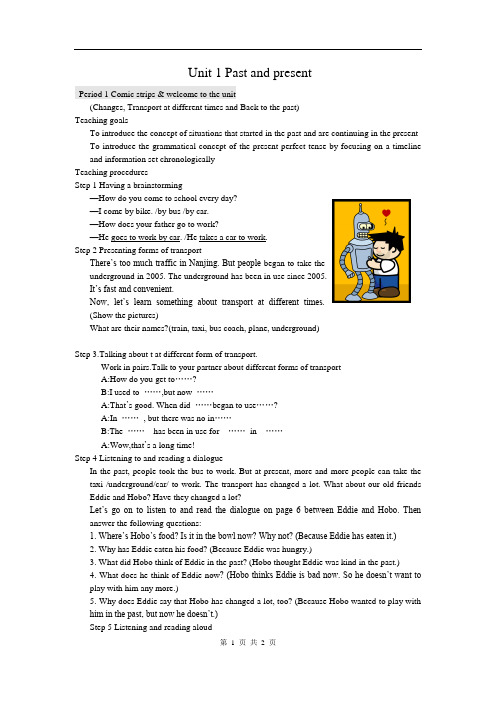
Unit 1 Past and presentPeriod 1 Comic strips & welcome to the unit(Changes, Transport at different times and Back to the past)Teaching goalsTo introduce the concept of situations that started in the past and are continuing in the present To introduce the grammatical concept of the present perfect tense by focusing on a timeline and information set chronologicallyTeaching proceduresStep 1 Having a brainstorming—How do you come to school every day?—I come by bike. /by bus /by car.—How does your father go to work?—He goes to work by car. /He takes a car to work.Step 2 Presenting forms of transportThere’s too much traffic in Nanjing. But people began to take theunderground in 2005. The underground has been in use since 2005.It’s fast and convenient.Now, let’s learn something about transport at different times.(Show the pictures)What are their names?(train, taxi, bus coach, plane, underground)Step 3.Talking about t at different form of transport.Work in pairs.Talk to your partner about different forms of transportA:How do you get to……?B:I used to ……,but now ……A:That’s good. When did ……began to use……?A:In ……, but there was no in……B:The ……has been in use for ……in ……A:Wow,that’s a long time!Step 4 Listening to and reading a dialogueIn the past, people took the bus to work. But at present, more and more people can take the taxi /underground/car/ to work. The transport has changed a lot. What about our old friends Eddie and Hobo? Have they changed a lot?Let’s go on to listen to and read the dialogue on page 6 between Eddie and Hobo. Then answer the following questions:1. Where’s Hobo’s food? Is it in the bowl now? Why not? (Because Eddie has eaten it.)2. Why has Eddie eaten his food? (Because Eddie was hungry.)3. What did Hobo think of Eddie in the past? (Hobo thought Eddie was kind in the past.)4. What does he think of Eddie now? (Hobo thinks Eddie is bad now. So he doesn’t want toplay with him any more.)5. Why does Eddie say that Hobo has changed a lot, too? (Because Hobo wanted to play withhim in the past, but now he doesn’t.)Step 5 Listening and reading aloudListen to the tape, and try to read aloud the dialogue on page 6 to the tape.Step 6 Finding and writing expressionsYou are to go over page 6 and 7 again to find out and write down all the useful expressions.Step 7 Acting out the dialogueIn pairs you are to act out the dialogue.Step 8 Doing homeworka. Read the comic strips and try to recite it.b. Try to revise the phrase and sentences in this period.c. Do translation:1. 我的玩具飞机在哪儿?_____ my toy _____?2. 你的妈妈怎样去上班?乘坐地铁。
- 1、下载文档前请自行甄别文档内容的完整性,平台不提供额外的编辑、内容补充、找答案等附加服务。
- 2、"仅部分预览"的文档,不可在线预览部分如存在完整性等问题,可反馈申请退款(可完整预览的文档不适用该条件!)。
- 3、如文档侵犯您的权益,请联系客服反馈,我们会尽快为您处理(人工客服工作时间:9:00-18:30)。
M1 U1 Period 1 Welcome to the unitI. Look at the four pictures on page 1 in the students’ book and find the differences betweenAIn the United States, most children begin attending school when they are five years old. Public education is free and most children go to schools near their homes. Schools in these early years are fun. The children learn to read and write. But they also play games and go on trips. There is no reason at such an early age for him to hit the books.The situation changes as children become older. The subjects become more difficult .Students must learn about world history , algebra (代数) , and the life sciences. Tests become more common. Pressure is growing to hit the books, study hard, and advance. However, most serious students only really begin hitting the books for long hours when they reach high school.High school students who hope to continue their education at a collage or university must take a special national test called the S-A-T .The test has two parts .The first part tests the student’s ability with numbers and mathematical skills .The second part tests the student’s ability in the English language.The S-A-T test is very important .A high school student who gets a high score on the two parts of the test has a good chance to enter a top American collage .For this reason, many students hit the books for months to prepare for the S-A-T.1. Form this passage, we can clearly know “hitting the books” means_______A. working hard for the futureB. studying a subject carefullyC. reading books in a hurryD. reading books with great effort2. Which of the following statements can best express the main idea of this passage?A. The S-A-T is the most important test.B. Education is not easy in the United StatesC. “Hitting the books ” is very important for the students who want to advanceD. The more you want to learn, the more tests you want to pass3. American children don’t need _______if they want to study in public schools.A. to work hard at their lessonsB. to pay for the educationC. to hit the booksD. to take many tests4. The students in high schools ________.A. have to take the S-A-TB. are free and happyC. have to hit the books if they want to go to collegeD. don’t hit the books until they pass the S-A-T5. Which of the following is NOT true according to the passage?A. In American the students have to pass certain test to continue their educationB. Young children needn’t work hard at their lessons because education is freeC. Those who fail in the S-A-T cannot go to collegeD. The students must spend much time preparing for the S-A-TBStudents all over the world have to work for their education. A college education in the United States is expensive .The costs are so high that most families begin to save for their children’s education when their children are babies .Even so, many young people can’t afford to pay the expenses of full-time college work. They do not have enough money to pay for school costs .The cost of college education increases every year. However, classrooms are still crowded with students. Some American students have scholarship(奖学金) or other support ,but many do not.Students from other countries have money problems to solve, too. Because students in most international programs need to have a sponsor(担保人) ,they work hard to get scholarships or special loans(贷款) . International students understand the value of going to school in another country. They also know that it is difficult. However, it is usually possible for students from abroad to work on university campuses to pay for some of these costs of their education. Some people believe that students value their education more if they work for it.6. The main idea of this passage is ________A. American students’ economic (经济) problems in universitiesB. Foreign students’ problems in American universityC. The high costs of American college educationD. The way American students pay for their tuition (学费)7. College education in the United States is expensive, ________.A. so a lot of universities do not have enough studentsB. although costs for part-time study are quite cheapC. and therefore only the students supported by their families can to collegeD. but universities and college are still full of students8. Students studying abroad thing that ______.A. it is easier to get spare-time work in another countryB. they can receive a better degree than the home studentsC. there are more activities to take part in than at homeD. their main problem is the lack of money9. The author points out that _________A. international students solve their money problems in different waysB. international students can’t study full-time because they have to do spare-time jobsC. American students prefer to study in their own countryD. American students can attend college easily in foreign countriesI.huge, low-rise, tallerrows, put/place, belongings, schoolbags, homefewer, more, numberclose, ease, same, kind, strictII.1. 选D。
